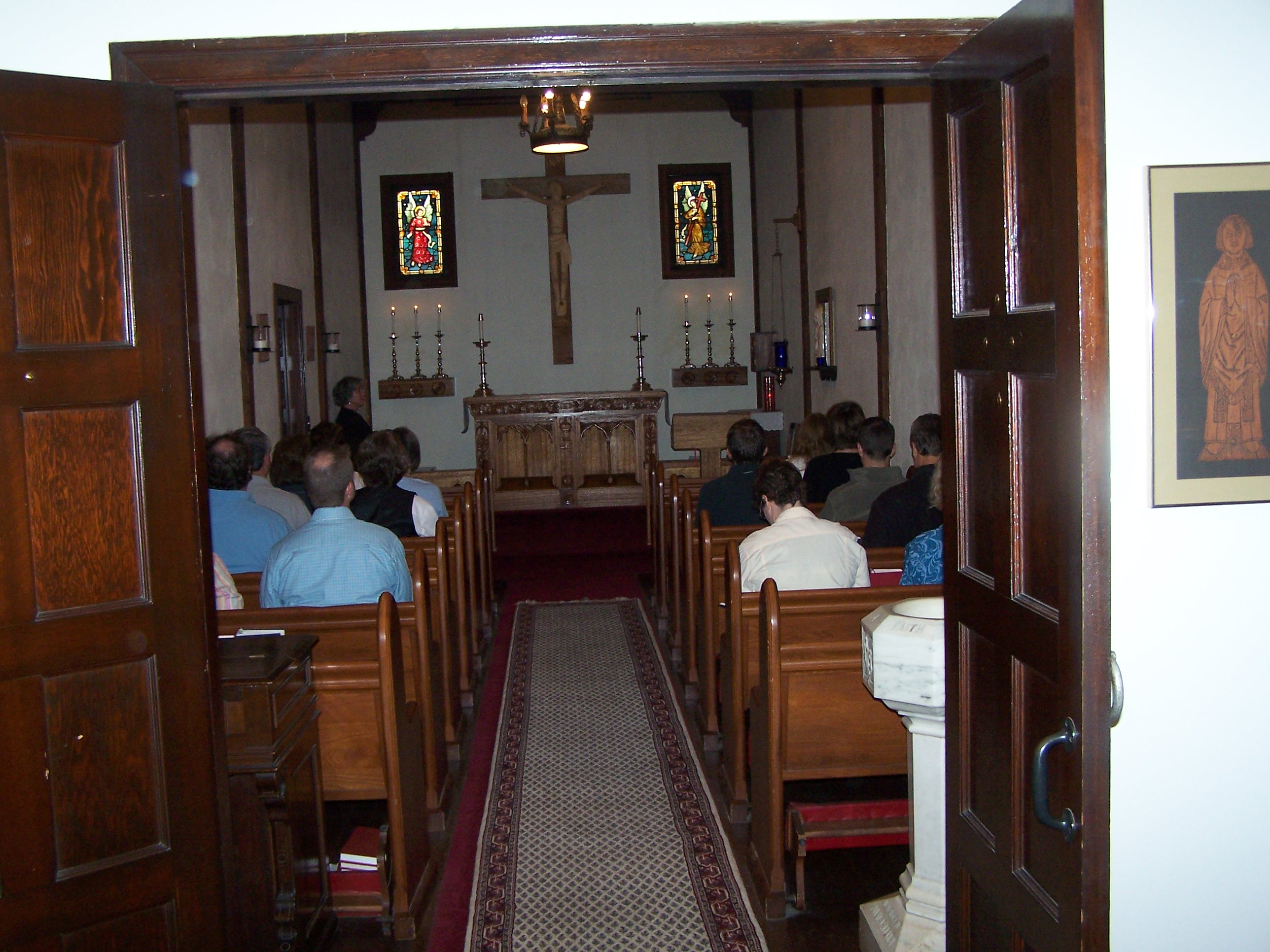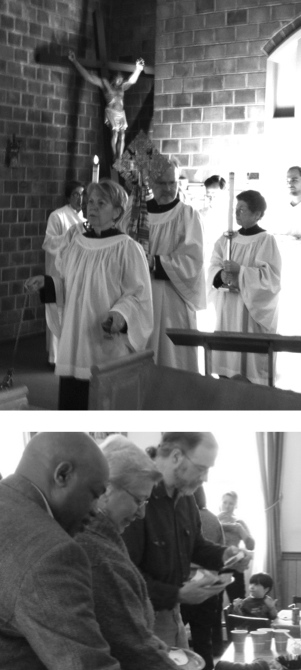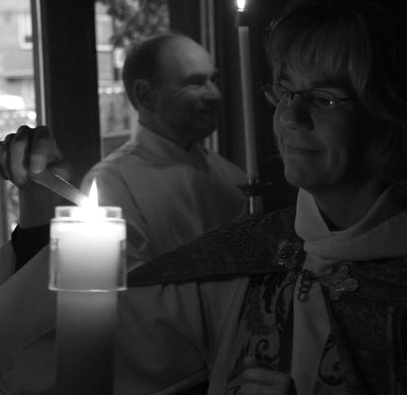Worship that swept us off our feet: Instinctual and intuitive leadership
 Friday, May 3, 2013 at 4:04PM
Friday, May 3, 2013 at 4:04PM Worship that swept us off our feet
Worship that swept us off our feet
So what’s transferable?
Small issues with large consequence
Instinctual and intuitive leadership
The role of the bishop and the diocese
Saint Paul's, Seattle: The Search Process
Instinctual intuitive leadership
There is a road from the eye to heart that does not go through the intellect. -Gilbert K. Chesterton
The congregation gathered in the coffee hour room. It was the new vicar’s first Sunday. This was a parish that had a rich history of city ministry. People in the community loved that its bells rang three times each day for prayer. It had used up its endowment during the depression to buy coal for people in the neighborhood of small row houses. That was still remembered. Over the years the numbers had grown smaller and smaller. The building however remained the same size with increased costs.
 The new vicar looked around the room and asked those gathered, “Who’s on the vestry?” John turned to Robert and asked, “Are you on the vestry?” And so it went. They had lost track. Elections hadn’t taken place for several years. They seemed tired.
The new vicar looked around the room and asked those gathered, “Who’s on the vestry?” John turned to Robert and asked, “Are you on the vestry?” And so it went. They had lost track. Elections hadn’t taken place for several years. They seemed tired.
The Bishop had no love for the parish. In a meeting in his office he had suggested to the new vicar that the task was how to close the place as soon as possible. Here in the coffee hour room members looked at the new vicar with depressed hopefulness. “Are you the one … or shall we look for another?”
“They don’t know who’s on the vestry!!” That was a new one for the young, unproven vicar. He couldn’t recall hearing about another parish that had lost track of its vestry.
The next step is obvious isn’t it? Parishes are suppose to have a vestry. Set things in motion, fix it—get a vestry in place! Or was there something else to be done?
The leaders we seek
Like everyone else I want my deacons, priests, and bishops to show love, joy, peace, patience, kindness, generosity, faithfulness, gentleness and self-control. I want them to have humility, gentleness, patience, forbearance born of love, eagerness to maintain unity in the bond of peace, truthfulness mediated in love, mutual kindness, tenderheartedness and forgiveness.[i] From them I hope for prudence, justice, fortitude, and temperance; I look for a sense of wonder and awe, reverence, knowledge, courage, counsel, understanding and wisdom.[ii]
Yes, I know all of the baptized are called to that life. I also know that when we experience these things in our deacons, priests and bishops we are better for it. And when we don’t experience it, something in us is lost and diminished. It has to do with the focusing and iconic nature of Holy Orders in the Body of Christ.
I also want the parish priest to have an ability for adaptive leadership, self differentiated leadership, transformative leadership, and situational leadership. Don’t you?
If I missed one, please add it to the list.
 A few years ago I suggested that parish priests needed five areas of competence—leadership ability, emotional maturity, spiritual maturity, competence in many of the skills related to effective priestly ministry, and priestliness.[iii] Maybe you have your own list of five things. A number of bishops seemed to like my list though there were some anxious about “priestliness.” Their anxiety about this, and in practice their avoidance of it, may help explain a blind spot in our system of educating and training priests.
A few years ago I suggested that parish priests needed five areas of competence—leadership ability, emotional maturity, spiritual maturity, competence in many of the skills related to effective priestly ministry, and priestliness.[iii] Maybe you have your own list of five things. A number of bishops seemed to like my list though there were some anxious about “priestliness.” Their anxiety about this, and in practice their avoidance of it, may help explain a blind spot in our system of educating and training priests.
Having said that let me move to another question—in the life of today’s church what is the primary kind of leadership we need from our parish priests?[iv]
Instinctual intuitive leadership
The instant that a Somali bullet shattered against the door frame, peppering his temple with fragments, Major David Stockwell was guided by his survival instinct. His instinct was not a simple fight-or-flight response. It had been trained through the stressful situations of his Army career starting with Ranger School more than ten years earlier. With bullet fragments in his head and blood flowing from his wounds, he functioned coherently and moved swiftly.[v]
Parish leaders only feel as though someone is shooting at them; and that only occasionally and metaphorically. But the need to behave reasonably and act quickly while under pressure is needed in many places including the parish church. It’s needed both in immediate, here-and-now situations, and as we navigate journeys that require years.
 All organizations need leadership that can routinely make wise and timely decisions based on an assessment of the situation with its challenges and opportunities. Parish leaders certainly require it in many here-and-now situations as well as in short and longer term action.
All organizations need leadership that can routinely make wise and timely decisions based on an assessment of the situation with its challenges and opportunities. Parish leaders certainly require it in many here-and-now situations as well as in short and longer term action.
None of us is able to act in a wise and timely manner if we constantly need to carefully diagnosis and judge each situation in front of us. That kind of behavior means that opportunities pass us by as threats multiple and increase in severity. If we are to be effective leaders a good bit of what we do needs to come to us spontaneously.
Those who are unable to function in an instinctive manner will tend to get paralyzed with excessive analysis—“If only we had more information all would be clear.” Or they decide and then feel conflicted and second-guess the decision. They may then change direction, not based on new information, but on fear.[vi]
I get faint and pass out; I’m disoriented but I manage to call a friend. My friend says, “Do you have a thermometer? Take your temperature.” Her EMT husband says “Call 911.”
The one is well intended but the other is an example of instinctual, intuitive leadership. It is a wise, quick response based on training and experience.
Second story. During the Korean War there is a battle shortly after Chinese troops enter the war. The US Army’s 2nd Division was under attack by overwhelmingly numbers of Chinese troops. To escape they needed to get the Division[vii] down a road from Kunuri to Sunchon through an area surrounded by high hills. There are large numbers of soldiers, vehicles and artillery to be moved. There are Chinese troops shooting from the hills above them. The description of what took place during part of the battle is that the enlisted soldiers, that were still able, were shooting up at the Chinese. They would get out of vehicles and do what they were trained to do—engage the enemy.
The officers on the other hand were focused on what they were trained to do—accomplish the larger mission; in this case getting as many troops and as much equipment to a safer place. One difference is how the role of the person influences action; another is how training and experience shape what is focused upon and the action taken.
A third story. The bishop made it clear that he expected the priest to conduct a relatively standard stewardship campaign—visits to homes, sermons and addresses on Sunday, and so on. The priest felt stuck. Even though the parish had made significant gains in membership and pledging in the past few years they were still receiving funds from the diocese. He didn’t want the bishop unhappy with him yet he knew that the standard approach wouldn’t work in this parish. When the priest met with his support group of other first-time-in-charge clergy his frustration and grumbling set off their frustration and grumbling. It became a free for all about how the diocese doesn’t support them. No one said ignore the bishop. Several did tell him to just get on with things and do what the bishop wanted.
Later he contacted a priest with considerable experience in parish ministry, a background of diocesan staff work, and training and experience in negotiating work relationships. In 15 minutes the priest had a plan. He called the bishop and asked if he could propose an approach to stewardship that he thought would accomplish the bishop’s objective of significantly increasing the parish’s capacity for financial self-support. The bishop agreed. The priest laid it out. The bishop said, “sounds great. Let me know how it goes.”
The priest didn’t have the experience and training needed to effectively address the situation. His support group only made things worse. They fed his unformed instincts to accommodate or get resistive with the bishop. His openness to some coaching from the right person turned the situation around and became an important part of his own formation. It gave him a mental model and some skills for approaching an authority figure in an interdependent rather than dependent or counter-dependent manner.
In all organizations there are those who because of role or temperament focus on the minutia of the job, disregarding the world around them. Leaders need to help the organization, in this case the parish church, see that “world about them”—take into account the possibilities of tomorrow as well as the realities of today, considering the prospects of a changing neighborhood and world as well as the stability of the parish community’s common life.
Dig up all the information you can, then go with your instincts. We all have a certain intuition, and the older we get, the more we trust it… I use my intellect to inform my instinct. Then I use my instinct to test all this data. Colin Powell in My American Journey.
In all these cases various factors come into play—the objective to be accomplished, understanding the inclinations and capacities of the people involved, the given limitations and possibilities of the situation, and the ability and commitment of leaders.
In parish here-and-now situations, in those places when the leader needs to take an action that moves things forward, the more that leader is in tune with what is going on around her and the more she is cognizant of her own limits and abilities, the more likely a successful outcome. This is much more that simple intelligence. Words like savvy, street-smart, and wisdom come to mind.
Know yourself, know your job, know your people
There are many here-and-now moments when it is time for the leader to propose or order a direction. At other times the need is for the leader to invite people into a focused conversation and to then design and facilitate that conversation toward a decision and action. The 101 of parish dynamics and leadership is that the leader must take the initiative—useful and owned decisions will rarely rise up out of the congregation.
 Behind a leader’s leading is a combination of skills, knowledge, stance and character.
Behind a leader’s leading is a combination of skills, knowledge, stance and character.
What does savvy and wisdom look like? Any of the emotional intelligence lists[viii] can tell us about the mix needed—self-awareness, social awareness involving empathy, self-management, and relationship management.
Leaders seeking to develop a stronger ability for instinctive, intuitive leadership might focus on:
- Knowing yourself – Self awareness, understanding your strengths and your blind spots
- Knowing your job – The work of a parish priest includes having mental models rooted in pastoral and ascetical theology for the formation of people and the shaping of the parish; habits allowing for grace during liturgy and leading meetings; and the practice of reflection and learning from experience.
- Knowing your people – A leader needs to understand the dynamics and culture of the parish, know who are the Apostolic Christians to be nurtured and encouraged, and what are the capacities and limitations of others in the parish.
This instinctual intuitive leadership gets developed in at least three ways. First by repetition in doing it again and again until it seeps into the pathways of brain and muscles. Second in rising from disciplined reflection on experience. And third through learned mental models that serve to provide perspective and coherence over many situations and years.
Back to Melissa and Saint Paul’s for a bit
Melissa Skelton’s ability to see the matters of large consequence within apparently small issues and her initial ability to know the core building blocks of revitalization are examples of instinctive intuitive leadership. In the “small matters” each situation is the kind of thing many clergy easily give way on, usually while making some rationalization.[ix] The rationalization may appear reasonable but is usually a reaction, rather than a response. The reaction is often rooted in the misuse of a conflict style such as accommodating or avoiding. For Melissa knowing the core building blocks was a result of training with the Church Development Institute and her having seen the effects in other parishes.
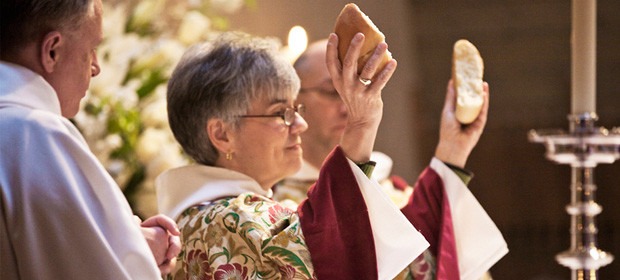 Melissa’s approach to those four “small issues”—incense, announcements, nametags, and Daily Office—was a timely, considered response grounded in training and experience. As noted in that earlier posting, “life is sacramental and the small things and habits have connections with deeper things. Too many have a weak grasp of sacramentality or of how human systems actually work. Our ways of doing things are interwoven with values as well as profound and often subconscious assumptions about the nature of God and humanity and the dynamics within and among.”
Melissa’s approach to those four “small issues”—incense, announcements, nametags, and Daily Office—was a timely, considered response grounded in training and experience. As noted in that earlier posting, “life is sacramental and the small things and habits have connections with deeper things. Too many have a weak grasp of sacramentality or of how human systems actually work. Our ways of doing things are interwoven with values as well as profound and often subconscious assumptions about the nature of God and humanity and the dynamics within and among.”
Melissa came to Saint Paul’s with many educational credentials but for the purposes of leading the parish other things were more important. It was the combination of her manager training at Procter & Gamble, the Church Development Institute, lab training with LTI and NTL, and her liturgical experiences at General Seminary, Trinity Wall Street, and St. Andrews, Trenton that provided the instinctive intuitive capacity for making effective responses at Saint Paul’s.
She came from a family heritage that contributed to how she saw the world. Her family assumes hard work and service to others. Also a lot of laughter. It was a family that took seriously loyalty to the family and patriotism toward the nation.
Melissa was still in the womb on her mother's birthday, November 30,1950. Her father was in Korea between Kunuri and Sunchon; what was later called “the Gauntlet.” Larry had participated in the Normandy invasion in 1944 and now in Korea he would win a Silver Star and Bronze Star for his service. Then when Melissa was older she saw her parents in a Southern school auditorium refusing to rise along with all the other parents when Dixie was played.
That’s part of how you learn courage, perseverance and resilience.
All this influenced Melissa's sense of judgment; her instinct—formed by family life in the South of the 50’s and 60’s, quality academic work, and training and coaching in organization development and Anglican pastoral and ascetical theology. Over time it had all been reflected upon and integrated into effective instinctive, intuitive leadership.
Melissa's an extrovert. As she has gotten older she’s become more interior.[x] In the past her extroverted spirit needed to be matched by coaching with a more inner driven spirit. That combination allowed for both helping the parish develop a rich, dense culture and also offer that life to others in an appealing way. Over time that became more integrated in her, part of who she is.
We all need that kind of companionship—a friend, coach, guide that helps us maintain perspective and see more broadly or more deeply, that assists us in seeing the larger picture or the important details. While successful instinctive intuitive leadership is primarily grounded in the leader having attained enough balance in herself, part of that wisdom is drawing on others in the same field with similar experience and training.
Without this balance, from within and in partnership with others, the temperament of a priest will cause the parish to gradually drift toward a life that is more and more interior and possibly isolated and purist or a life that is more and more external, program obsessed, and superficial.
The balance and density of a parish culture depends on activities that equip the instincts of members for participation in liturgy and parish life. Saint Paul’s needs core foundations classes and an attractive compelling web site; a rector that becomes a presence in the community and the Daily Office.
It’s surprisingly easy for a parish that has worship like that described by the two bishops—“a deep spirituality of engagement by the entire congregation…non-verbal participation by the entire congregation … acts of mutual reverence that had the effect of creating a sense of a community engaged in something entirely corporate and significant for them”—to drift into a life where the artifacts remain, the behaviors are still there, but something has become disconnected. Training programs in Eucharistic Practices are needed from time to time to maintain the instinctual nature of the shared life.
Back to instinctual intuitive leadership
Reading and being able to engage situations and people is at the heart of this ability—picking up on body language, understanding personality types, sensing resistance or receptivity, and seeing and knowing the dynamics of group life, are all needed skills
Such leaders know their own limits and are able to manage their feelings and moods.
While the basic ability has to be in the person none of us will have the ability to behave in this manner in all situations. There will be many that are outside our training and experience. So, we need others we listen to. We don’t really need a support group to cheer us on or enable our oppositional stances. If we are young or inexperienced we need a coach. Someone with wisdom that is grounded in the experience and training we lack. If we are older, with more experience, we can use need a “balancer.” A person we trust that can help us keep perspective and offer knowledge we lack.
Wisdom in action is what this is about—“be transformed by the renewing of your minds, so that you may discern what is the will of God-what is good and acceptable and perfect.”[xi] And given that the ability to know what is the right decision and be able to provide the needed leadership to face into the situation.
This is something we can learn. The goal is to develop the capacity in relation to the particular vocation, work and situations we have given ourselves to in life. It’s about developing subconscious and automatic responses that are in alignment with that life. It is built up in us as we do similar things again and again, reflect upon the experiences, and generalize and apply it correctly. It’s a trained “gut feeling,” an automatic response available for making difficult decisions in a wise and timely manner.
If you had more experience and less confidence I might be inclined to listen to you
These were the words of Sister Evangelina, an older Anglican nun and midwife, to Trixie, a young midwife in PBS’s “Call the Midwife.”
It’s part of the problem we face. There are too many clergy (and laity) with firm opinions about how to revitalize parish churches without the experience and training to make such opinions wise—lots of confidence with little experience. Which is to say they lack humility.
There’s not a short cut in the elements that allow for wise, timely decision-making and action. If we are to become the leaders the church needs we will submit ourselves in obedience to the processes of:
1) Repetition—doing things over-and-over until useful patterns of acting seep into the pathways of brain and muscles. A priest learning to preside at the Eucharist gracefully and with calm presence. Lay and clergy leaders able to smoothly facilitate meetings so people are heard, needed information made available, choices explored, and internal commitment reached.
2) Disciplined reflection on experience—in training exercise, spiritual direction, therapy, and coaching giving ourselves to better understand ourselves, our work, and the people we serve. This is a stance, that once learned that changes our walks, reading, dreams, and conversations.
3) Learning and using mental models—ways of seeing and perceiving that provide perspective and coherence.
These three things are obviously interdependent. They reinforce one another.
The most dangerous leadership myth is that leaders are born-that there is a genetic factor to leadership. That’s nonsense; in fact, the opposite is true. Leaders are made rather than born. Warren Bennis
As a system we, the church, give authority and responsibility to people without them having the needed training, coaching, and supervision. It is as though a student would finish medical school and be handed a knife and told to go out and cut. It’s as though the Marine Corps would place untrained officers to lead other men and women to battle. Our doctors need to go to medical school, Marine Corps platoon leaders need to have been through college and a form of boot camp, and priests need to have gone to seminary. Those things do not provide enough initial training and experience to address the situations faced early on in parish ministry.
Some years ago I had a priest friend tell me about the research he was doing as part of a doctoral program in organization development. He was looking at how the local Episcopal diocese and Lutheran Synod dealt with the placement of new clergy. Dick’s conclusion was that all too frequently the new clergy were set up for a career of difficulty and feelings of inadequacy. They were being placed in situations that went too far beyond their training and experience. They were not provided with adequate coaching or supervision.
Winning is a habit. Unfortunately, so is losing. Vince Lombardi
We can do better.
Or was there something else to be done?
The new vicar would make many mistakes in his seven years at the parish. He hired and fired staff in the clumsiness of ways. With magnificent and sentimental ineptness he over-involved himself in helping a family that appeared at the rectory door one night. He found himself outmaneuvered several times by con artists posing as people in need. On the other hand his instincts were perfect when a man walked into a small parish meeting and drew a revolver, and when a separated angry spouse sat in a pew trying to intimidate his wife then serving at the altar, and when a young man pulled a knife as he was walking though the neighborhood with two parishioners. He knew what the congregation needed at that Easter Vigil minutes after a beloved member fell to the parish hall floor with a heart attack and was rushed to the hospital. And he knew how to nudge, coax, and push the parish toward it’s own health and growth.
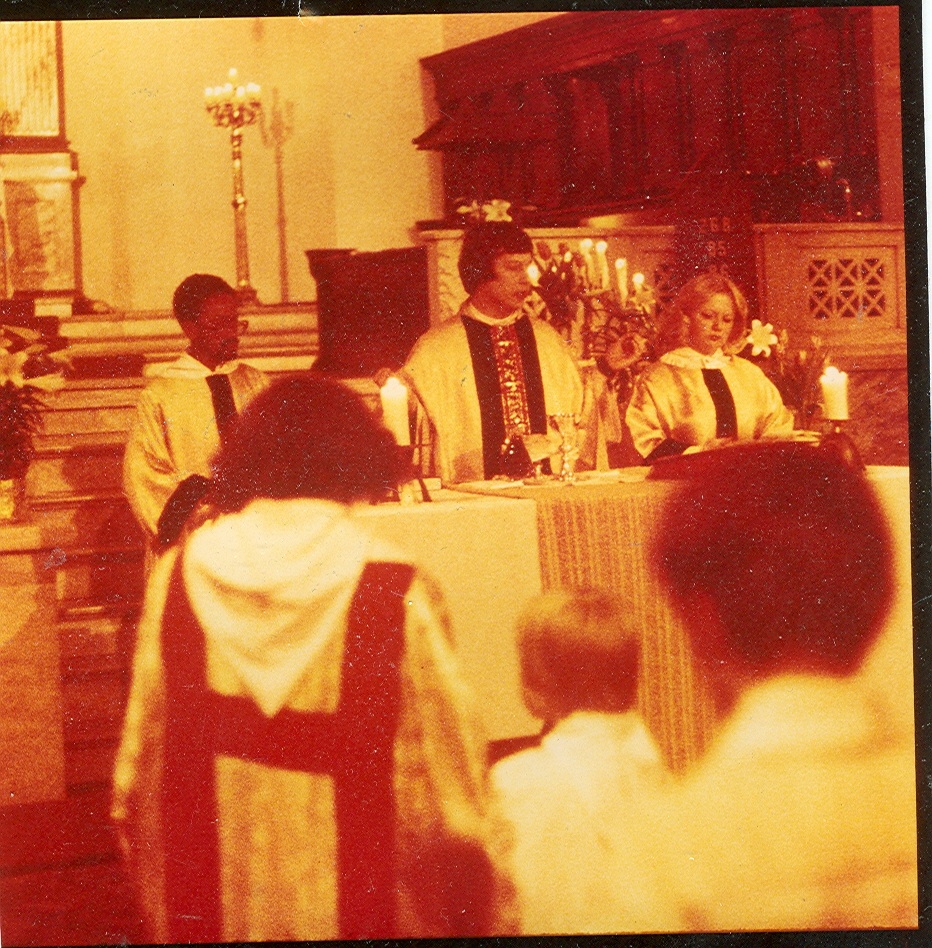 His instincts were also just right that first Sunday. They needed a vestry but it had to be the right vestry.
His instincts were also just right that first Sunday. They needed a vestry but it had to be the right vestry.
The vicar said, “How about we do this? I want to have a meeting every Sunday for the next three months in the hour before the 10:30 Mass. We’ll use those meetings to find a way forward for the parish. Those who are present for every meeting will be the vestry for the coming year. What do you think?” They agreed. There was a unanimous vote to proceed.
They went forward with the meetings. The congregation and its new vicar looked at the demographics, poured over parish statistics, told stories about the parish’s past, and shared hopes for the future. Over the months a direction was created and a vestry emerged.
What were his instincts about in all this? Why not simply get on with things and restore the parish to proper functioning right away?
Maybe the results make the point.
- Everyone in the congregation had the opportunity to participate in shaping the future and the direction was “owned.”
- A strong connection developed between the new vicar and the congregation
- The congregation learned a set of new habits for collaboration and decision making
- A vestry was in place with the commitment needed for the situation and grounded in a direction broadly owned in the parish
- The new vicar “proved” himself—to himself as well as allowing the congregation to see that he had something to offer them.
The vicar had considerable experience and training in collaborative decision-making process, group facilitation skills, the issues and dynamics of an urban parish, and staying in role as the positional leader while managing a shared leadership process. His instincts for this particular situation were well grounded.
He was getting them to the new vestry while also helping that vestry and the congregation set themselves up for success.
rag+
Worship that swept us off our feet
Worship that swept us off our feet
So what’s transferable?
Small issues with large consequence
Instinctual and intuitive leadership
The role of the bishop and the diocese
Saint Paul's, Seattle: The Search Process
[i] Galatians 5: 22-26 and Ephesians 4: 1 - 3
[ii] The traditional Cardinal Virtues and Seven Gifts of the Holy Spirit.
[iii] Fill All Things: The Dynamics of Spirituality in the Parish Church, Robert A Gallagher, Ascension Press, 2008, page 86. Also available in more detail as part of a parish based discernment process at “Parish Discernment - Formation Process of Aspirants for Priesthood”
[iv] We also need instinctive intuitive leadership from our bishops but that is a topic all its own.
[v] “No Excuse Leadership” Brace E. Barber, 2004 John Wiley and Sons
[vi] In leadership training programs one of the common frustrations expressed by participants is along these lines: “We need more information to decide that.” And “This is unrealistic, there’s not enough time.” And “The directions weren’t clear.” In fact leaders have to make decisions without knowing all the possible information and there is frequently a need to decide and act in a timely manner. One of the signs we look for in a leader’s development is when the grumbling stops and the person simple gets to work. This is often a sign that the person is now both more reality based and also less concerned about how they will look to others, more willing to risk. They are coming to a place where they accept things as they are—no one gives you “clear directions” to make your decision making easy, no one makes sure you have all the possible information so you can get it right and look good.
[vii] about 12,000 to 15,000 soldiers down a road from Kunuri to Sunchon
[viii] Here are a couple of emotional intelligence models.
Possibly the most useful is Introduction to Type and Emotional Intelligence, Roger R. Pearman, from Consulting Psychologists Press (CPP) Pearman brings together an generally familiar approach to personality with EI.
[ix] Common rationalizations: “I don’t want to die in that ditch.” “This isn’t an essential matter.” “Most people do not really care about this.” Add your own.
[x] As we age its as thought three is an invitation to become more balanced. It’s possible for our attention and energies to go to new places
[xi] Romans 12




